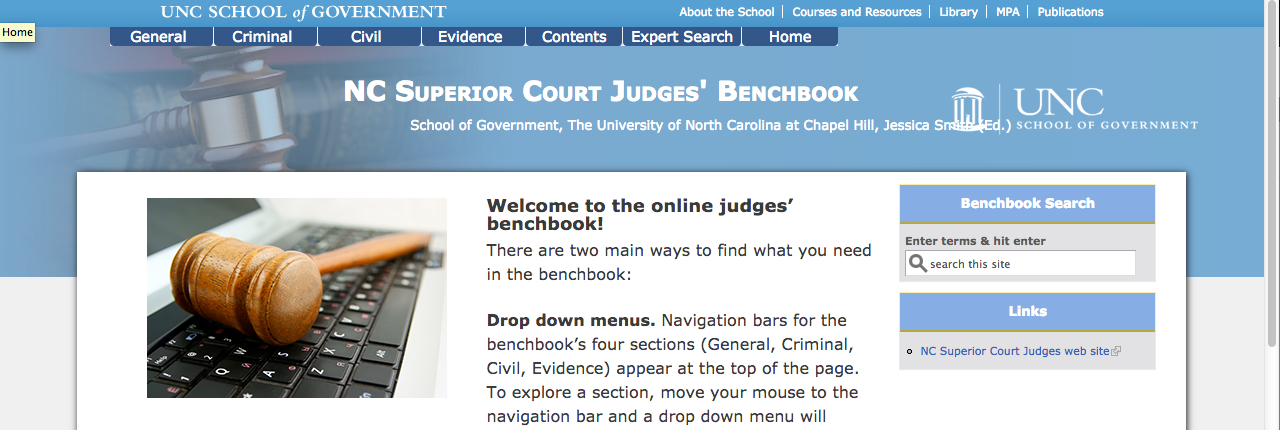Covering Judicial Administration, Criminal Procedure, Evidence, and Civil matters, the NC Superior Court Judges' Benchbook serves as the judges' primary reference tool, on and off the bench. The Benchbook is fully searchable, both with full-text and expert search options, has menus and breadcrumb trail for easy navigation and orientation and offers download-options as well as immediate in-browser-display of each section.
To access the Benchbook, visit http://benchbook.sog.unc.edu/
Chapters:
Contempt, Inherent Authority, Closing Proceedings, Gatekeeper Orders, Access to Court Records, Pro Hac Vice Admissions, Findings of Fact and Conclusions of Law, Judicial Immunity, Recusal, One Trial Judge Overruling Another, Out-of-Term, Out-of-Session, Out-of-County, Functus Officio, Trying a Non-Capital Criminal Case--An Outline for the Superior Court Judge, Sealing Warrants, Grand Jury, Grand Jury Proceedings, Grand Jury: The Foreperson, Indictments, Arraignment in Superior Court, Pretrial Release, Counsel Issues, Discovery, Def’s Right to 3rd Party Confidential Records, Securing Attendance of Witnesses, Pleas and Plea Negotiations, Double Jeopardy, Motions to Suppress, Motion to Suppress Procedure, Interrogations, Warrantless Stops, Traffic Stops, Jury Issues, Jury Selection, Note Taking by the Jury, Jury View, Jury Review of Evidence, Trial in the Defendant's Absence, Restraining the Defendant during Trial, Absolute Impasse, Sequestration of Witnesses, Voir Dire, Voir Dire on Pretrial and In-Court Identification, Voir Dire on Intoximeter, Voir Dire on Evidence of Tracking by Bloodhounds and Other Dog Breeds, Voir Dire on Drug Detection Dogs, Voir Dire on a Dying Declaration, Voir Dire on Incriminating Statements, Motions to Dismiss, Motions to Dismiss for Insufficiency of the Evidence, Corpus Delicti, 5th Amend. Privilege & Immunity, Extending the Session, Opening and Closing Statements, Content of Opening and Closing Statements, Order of and Limits on Closing Argument, Jury Deadlock, Jury Verdict, Sentencing, Crime Victims' Rights Act: Covered Crimes, Sentencing Charts, Minimum/Maximum Charts for Felonies Committed on or after 10/1/2013, Minimum/Maximum Charts for Felonies Committed on or after 12/1/2011, Maximum Chart for Class B1-E Sex Offenses Committed on or after 12/1/2011, Minimum/Maximum Charts for Felonies Committed 12/1/09 to 11/30/2011, Minimum/Maximum Charts for Felonies Committed 12/1/95 to 11/30/09, Minimum/Maximum Charts for Felonies Committed 12/1/94 to 11/30/95, Punishment Chart for Misdemeanors Committed on or after 12/1/1995, Drug Trafficking Sentencing, Prayer for Judgment Continued, Limitations on More Severe Sentence, Sex Offenders, Sex Offender Registration & Satellite-Based Monitoring, Petitions to Terminate Sex Offender Registration, Attorney Fees, Probation Violations, Summary of Probation Response Options, Remand to District Court, Habeas Corpus, Correcting Errors Sua Sponte, Motions for Appropriate Relief, Post-Conviction DNA Testing, Defendants' Objection to Early Disposal of Biological Evidence, Ineffective Assistance of Counsel, Service of Summons Deadlines, Default Judgment (Rule of Civil Procedure 55), Temporary Restraining Orders and Preliminary Injunctions, Rule 9(j) of the Rules of Civil Procedure: Special Pleading in Medical Malpractice Claims, Time Limits on Rule 12(b) Motions, Voluntary Dismissals (Rule of Civil Procedure 41(a)), Dismissal for Failure to Prosecute, Civil Discovery Sanctions, Standard Remarks to Jurors, Introduction, Voir dire, Prospective Jurors, Before Selection in Case, After Impaneled, Routine Limiting Instructions in Civil Cases, Before Charge Conference, Before Final Arguments, Jury Review of Evidence in Civil Deliberations, Findings of Fact and Conclusions in Civil Orders, Closing Arguments in Civil Trials, Taking a Civil Verdict, Immunity of the State and Local Governments, Will Caveats, Attorney Fees in Small-Verdict Cases, Attorney Fees in Non-Justiciable Cases, Rule of Civil Procedure 60(b)(6), Judicial Notice, Relevancy, Rule 404(b): Evidence of Other Crimes, Wrongs, or Acts, prior bad acts, bare fact of conviction, Character Evidence, Character Evidence Cheat Sheet, Character Evidence Outline, Habit Evidence, Impeachment, Rule 609: Impeachment by Evidence of Conviction of a Crime, Pleas and Plea Discussions, Refreshed Recollection, Sexual Assault Cases: The Rape Shield Law and Evidence of Prior Sexual Misconduct by the Defendant, Criminal Cases Involving Child Victims and Child Witnesses, Hearsay Rules, Confrontation Clause, Routine Limiting Instructions in Criminal Cases, Capacity to Proceed, Judge's Commission, Completing Another Judge's Work
Keywords:
Inherent, Alamance County, separation of powers, judicial authority, due process, jurisdiction, facilities, courthouse, contempt, attorneys, constitution, independent branch, control, gatekeeper order, First Amendment, Sixth Amendment, constitution, Waller v. Georgia, Press-Enterprise, Presley v. Georgia, Virmani, GS 1-72.1GS, 15-166GS, 15A-1033GS, 15A-1034, Gatekeeper Orders, Estate of Dalenko v. Monroe, All Writs Act, First Amendment, Baltimore Sun, Chapter 132, email, Virmani, Suppress, mistrial, motion for appropriate relief, Rule 52, TRO, preliminary injunction, dismiss, judgment on pleading, summary judgment, Rule 12(b)(6), Rule 56, contempt, relief from judgment, Rule 60(b), Rule 11, attorney's fees, Section 1983, Butz v. Economou, employment discrimination, absolute immunity, qualified immunity, Recusal, Disqualification, bias, prejudice, appearance of impropriety, election, due process, Superior court, jurisdiction, interlocutory, Rule 59, Rule 60, motion for appropriate relief, summary judgment, Superior court, rotation, chambers, in vacation, G.S. 7A-47.1, Rule 6(c), jurisdiction, commission, Judgment, interlocutory, correction, record on appeal, motion for appropriate relief, Rule 60(b), Rules of Appellate Procedure, G.S. 15A-1414, arraignment, jurisdiction, competency, recordation, jury, note taking, exhibits, opening statement, closing statement, charge conference, alternate jurors, jury deliberations, fee applications, Public records law, Virmani, In re Investigation into the Death of Cooper, foreman, Cofield, G.S. 15A-941, arraign, arraignment, G.S. 15A-928, bond, secured bond, unsecured bond, custody release, written promise, electronic monitoring, impaired driving holds, cash bonds, green money bonds, bond doubling, failure to appear, forty-eight hour rule, Indiana v. Edwards, hybrid counsel, Brady material, false evidence, In camera review, Nonresident witness, 15A-805, witness in custody, Guilty Pleas, Alford plea, no contest plea, factual basis, guilty plea, colloquy, guilty plea, Fifth Amendment, Blockburger, collateral estoppel, GS. 15A-974, illegally obtained evidence, evidence, suppression, voluntariness, exclusionary rule, Miranda, custody, right to remain silent, Fifth Amendment, self-incrimination, juveniles, right to counsel, recording requirements, Montejo, Rothgery, Terry, Terry stops, reasonable suspicion, probable cause, frisk, stop and frisk, arrest, search incident to arrest, protective sweep, community caretaking, Hodari D., Botick, plain view, plain feel, vehicle stops, reasonable suspicion, car frisk, drug-sniffing dogs, drug dogs, weaving, pretextual stop, impaired, Batson, peremptory challenges, peremptories, challenges for cause, hardship excuses, G.S. 9-3, equal protection, race discrimination, racial discrimination, fair cross section, special venire, petit jury, juror voir dire, stake-out questions, death qualification, note, notes, note-taking, jury deliberations, jury’s request to review evidence, trial in absentia, shackling, restraint of the defendant, State v. Ali, corpus delecti, extrajudicial confessions, motions to dismiss, G.S. 15A-1051, G.S. 15A-1052, G.S. 15A-1055, self-incrimination, privilege, jury argument, closing statement, opening statement, final argument, time limits, Rule 10 of the General Rules of Practice, G.S. 7A-97, failure to reach a verdict, jury deadlock, Allen charge, jury poll, CVRA, G.S. 15A-830, substantial assistance, North Carolina v. Pearce, 15A-1335, resentencing, re-sentencing, sexually violent offense, SBM, sexually violent predator, recidivist, aggravated offense, lifetime monitoring, Sex offender, registry, registration, Wetterling, SORNA, SBM, Attorney Fee Calculator, IDS rate chart, attorney's fees, Average Attorney Hours Per Type of Case, attorney's fees, G.S. 15A-1342, probation response options, habeas writ, writ of habeas corpus, clerical errors, sentencing errors, judicial errors, inherent authority, credit for time served, motion for appropriate relief, MAR, newly discovered evidence, post-conviction, Post Conviction, DNA, post-conviction testing, attorney error, Strickland, Cronic, denial of counsel, Cuyler, conflict of interest, Harbison, admission of guilt, Rule 4, extension, alias and pluries, Entry of default, Default Judgment, Rule 55, Rule 60, good cause, excusable neglect, void judgment, Rule 65, bond, appeal, injunction, TRO, Rule 5, Rule 9(j), special pleading, medical malpractice, medical malpractice complaint, voluntary dismissal, without prejudice, two-dismissal rule, savings provision, statute of limitations, tolling, Rule 41, Voir dire, G.S. 8C-1, Rule 105, civil deliberations, jury deliberation, jury review, review of evidence, jury room, Rule 12(b)(6), failure to state a claim, Rule 41, Rule 52, Rule 56, Rule 65, Sovereign immunity, governmental immunity, governmental functions, proprietary functions, waiver of immunity, legislative immunity, judicial immunity, local governments, State Tort Claims Act, Negligence, risk pool, public duty doctrine, official capacity, individual capacity, public official, public employee, § 1983, Probate, special proceeding, clerk of court, caveator, propounder, In re Will of Andrews, devisavit vel non, Attorney’s fees, Rule 60, catch-all, motion for relief, equitable relief, relief from judgment, grant reservoir, Rule 201, judicial notice, adjudicative fact, legislative fact, logical relevance, legal relevance, direct evidence, circumstantial evidence, conditional relevance, chain of events evidence, context evidence, guilt of another evidence, demonstrations, weapons evidence, 404(b) evidence, evidence of flight, gang-related evidence, negative evidence, victim impact evidence, photographs, Rule 403, probative value, prejudice, Whaley, stipulations to prior convictions, Old Chief, photographs, 404(b) evidence, 609 evidence, weapons evidence, demonstrations, expert testimony regarding eyewitness identification, evidence of prior false accusations, Wilkerson rule, Rule 404(b), Rule 406, Rule 609, Rule 404, Rule 405, Rule 404(a), Rule 404(b), Rule 607, Rule 608, Rule 609, propensity, habit, extrinsic evidence, pertinent trait, law abidingness, State v. Fair, State v. Tappe, Rule 403, prior inconsistent statement, bias, extrinsic evidence, specific contradiction, defendant’s silence, subterfuge, cross-examination, impeachment, Evidence Rule 410, G.S. 15A-1025, guilty pleas, no contest pleas, present recollection refreshed, past recollection recorded, Evidence Rule 412, sexual history, anatomical dolls, confrontation, excited utterance, for purpose of medical diagnosis and treatment, Hinnant test, profile evidence, syndrome testimony, excited utterance, residual exception, dying declaration, present sense impression, Hinnant rule, regularly conducted business activity, public records, unavailability, statement against interest, Guide to Crawford & the Confrontation Clause, Melendez-Diaz, Giles, Davis, Bullcoming, Williams, Whorton, testimonial, non-testimonial, nontestimonial, notice and demand, Sixth Amendment, cross-examination, The Bruton Rule: Joint Trials & Codefendants' Confessions, confrontation clause, joint trial of codefendants, Richardson v. Marsh, redaction, redacted confession, Gray v. Maryland, capacity, incapacity, competency, state psychiatric facility, local forensic screener, forcible medication, capacity examination, capacity hearing, AOC-CR-207A, AOC-CR-207B, AOC-CR-208A, AOC-CR-208B, involuntary commitment, commission, assignment, master calendar, order of recall, emergency judge, retired judge, disabled judge, Rule 63, G.S. 15A-1224
This is a chapter deals with the interpretation of relevant evidence on a variety of topics as they pertain to criminal law.






